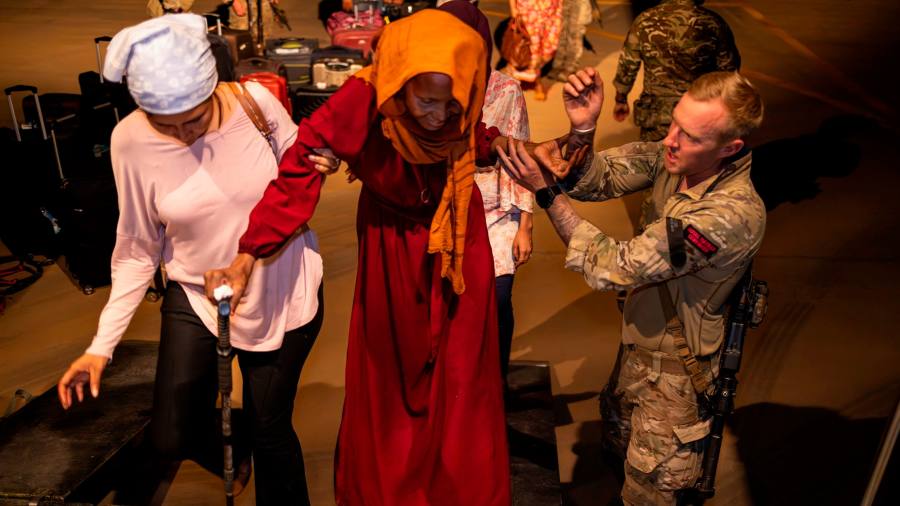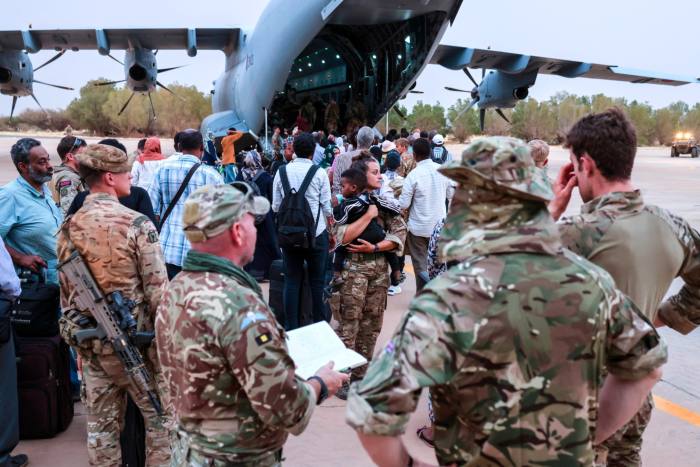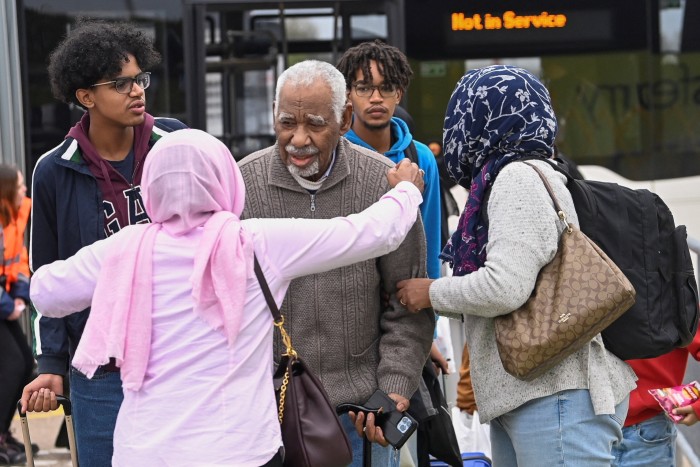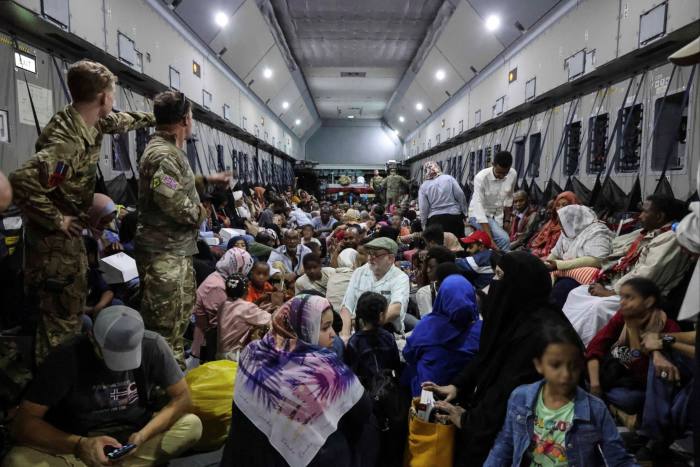
The rescue of its diplomats from the Sudanese capital last weekend by special forces was meant to demonstrate that Britain was still a top tier fighting force and possibly even help expunge the bitter memory of its chaotic withdrawal from Kabul two years ago that left many Afghans eligible for relocation to the UK stranded.
SAS troops were inserted by US Chinook helicopters into the heart of Khartoum before a dash in commandeered 4x4s to the Wadi Seidna airfield 40km outside the capital where British military aircraft were waiting to fly everyone back to Cyprus. The complex operation was successful and casualty free.
But the operation, which involved 1,200 military personnel, brought out just two dozen British diplomats. As the week progressed, the UK faced growing criticism for rescuing fewer nationals from Sudan than other European countries, such as France and Germany, and accusations that its restrictive rules on who can board the flights had left people stranded.
“We initially went for a Milk Tray man-style special forces approach,” said Edward Stringer, a former senior officer in the Royal Air Force, referring to a long-running TV advertising campaign featuring a mysterious black-clad operative who performs death defying feats to deliver a box of chocolates.
“In fact, all that was required was Deliveroo. It was hard to read the risks on the ground, though, and the Europeans’ lower risk approach could have gone the other way.”
Sudan’s brewing civil war threatens to tear apart Africa’s third biggest country, scatter its 46mn population, and light “a fuse that could detonate across borders,” UN Secretary-General António Guterres warned this week.

Tens of thousands of refugees have already crossed into neighbouring Egypt, Chad and South Sudan since fighting erupted on April 15 between the country’s armed forces, led by de facto president Abdel Fattah al-Burhan, and the paramilitary Rapid Support Forces, led by vice-president Mohamed Hamdan Dagalo.
After pulling out its diplomats in the mission that brought in the SAS, the US has eschewed any further evacuation and told its estimated 16,000 dual nationals in Sudan to find their own way out. But other countries have worked to rescue their citizens amid the fighting, which has so far left 512 dead and 4,200 wounded, according to Sudan’s health ministry.
Among European nations, France began airlifting its citizens out last Sunday, only a few hours after the British evacuated its diplomats, and had rescued 936 people as of Thursday.
Germany had got 700 people out by Tuesday, showing up the British effort which only began that same day as a partially respected, 72-hour ceasefire began. German foreign minister Annalena Baerbock appeared to take a thinly veiled swipe at the UK’s efforts: “It was important for us that, unlike other countries, our evacuation includes not only our embassy personnel but all Germans in the country and our partners.”
Tobias Ellwood, chair of the House of Commons defence select committee, was also critical. “While there are significant differences between the fall of Afghanistan to the Taliban and the current crisis in Sudan, it is disappointing that it appears to have taken the UK longer than our allies to get vulnerable citizens to safety.”
By Friday evening, however, the fourth day of the UK’s airlift, the government said 1,573 people had reached Cyprus, before being flown on to London’s Stansted airport. There are roughly 4,000 dual UK-Sudanese nationals and 400 UK nationals in Sudan.
In Downing Street, the operation is seen as a great success so far. For all the many differences between the evacuation of Khartoum and the 2021 pull out from Kabul — where Britain had a longstanding military presence — prime minister Rishi Sunak was under pressure to deliver.

“We have proved we can run an effective evacuation,” said one government insider on Friday, adding that Sunak had chaired six meetings of the Cobra emergency committee to co-ordinate the response.
British officials rejected criticism of the plan to pull out UK diplomats first, pointing to the fact the embassy was in the middle of the fighting and that there were concerns that staff were potential targets.
One of Sunak’s colleagues also dismissed suggestions the initial response was over-cautious: “It was a totally different situation to Kabul. We had no presence there [in Sudan], no infrastructure.”
Like many evacuees, Ahmed Osman, 42, a dual Sudanese-British citizen, who left the country on the first RAF flight on Tuesday, is deeply grateful to the armed forces for helping him, his wife and 18-month-old baby get out.
But to get to Wadi Seidna airfield he and his family had to pass through multiple military checkpoints with gunfire breaking out sporadically on the journey and he expressed frustration at how the immigration process had been handled.
“After they evacuated the diplomats, the British government just made statements telling us to stay indoors, and we lost hope . . . and felt abandoned,” he said. “The actual experience of getting evacuated was hard,” he added.

Others underwent a more tortuous process. Sudanese-born Dr Abdulrahman Babiker, who works at Manchester Royal Infirmary and was in the country visiting family for Eid, was initially turned away by the British at the airfield despite having a UK work permit.
Babiker is due back on shift on Tuesday but soldiers at the airfield told him “guidance from the Home Office” meant only UK passport holders were being accepted.
Shortly after the opposition Labour party urged the government to expand the guidance to all UK residents, Babiker told the BBC he was on a flight out.
On the ground in Sudan, the situation remained highly volatile. Khartoum residents told the FT intense fighting had resumed, despite the two sides agreeing to extend the ceasefire.
A Turkish military aircraft using the Wadi Seidna airfield came under small arms fire on Friday, although nobody was hurt. Hours later the UK said it would cease evacuation flights on Saturday.
Asked if that meant the UK would abandon those left behind, deputy prime minister Oliver Dowden told Sky News: “I wouldn’t accept that characterisation . . . just like other countries we are saying you still have another 24 hours to make your way to the airport . . . that gives us the longest and largest evacuation of any western country.”

